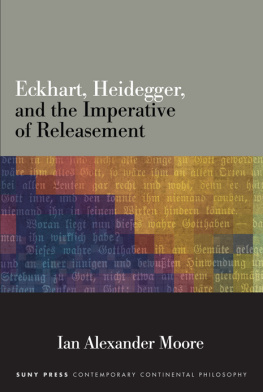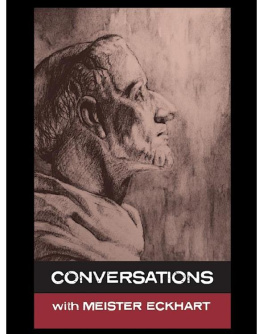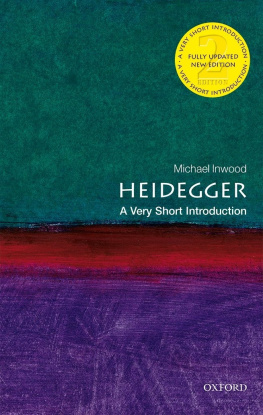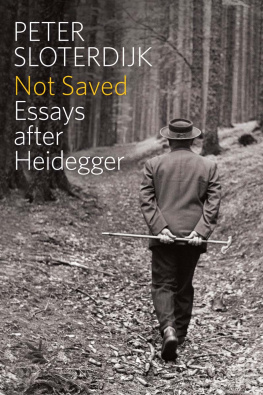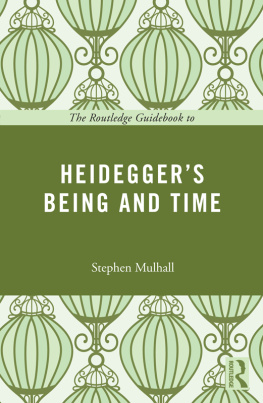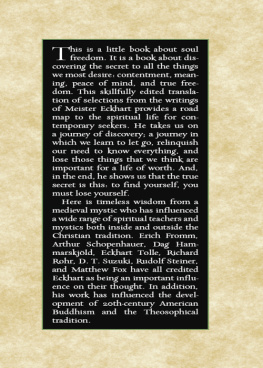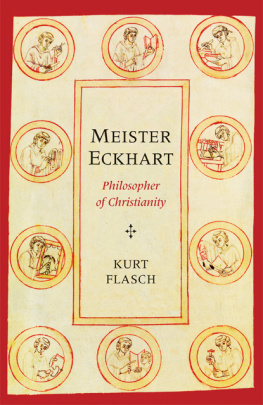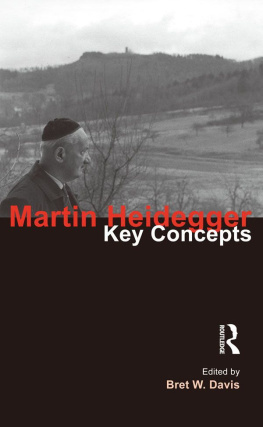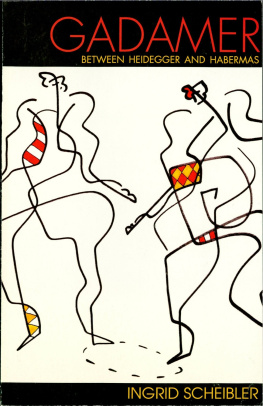Eckhart, Heidegger,
and the Imperative
of Releasement
SUNY series in Contemporary Continental Philosophy
Dennis J. Schmidt, editor
Eckhart, Heidegger,
and the Imperative
of Releasement
Ian Alexander Moore
Published by State University of New York Press, Albany
2019 State University of New York
All rights reserved
Printed in the United States of America
No part of this book may be used or reproduced in any manner whatsoever without written permission. No part of this book may be stored in a retrieval system or transmitted in any form or by any means including electronic, electrostatic, magnetic tape, mechanical, photocopying, recording, or otherwise without the prior permission in writing of the publisher.
For information, contact State University of New York Press, Albany, NY
www.sunypress.edu
Library of Congress Cataloging-in-Publication Data
Names: Moore, Ian Alexander, author.
Title: Eckhart, Heidegger, and the imperative of releasement / Ian Alexander Moore.
Description: Albany : State University of New York Press, [2019] | Series: SUNY series in contemporary continental philosophy | Includes bibliographical references and index.
Identifiers: LCCN 2018054672 | ISBN 9781438476513 (hardcover : alk. paper) | ISBN 9781438476537 (ebook)
Subjects: LCSH: Heidegger, Martin, 18891976. | Eckhart, Meister, 1327 Influence. | Ontology. | Metaphysics.
Classification: LCC B3279.H49 M586 2019 | DDC 193dc23
LC record available at https://lccn.loc.gov/2018054672
10 9 8 7 6 5 4 3 2 1
Meinen Meistern gewidmet.
Contents
C HAPTER 1
The Thinker and the Master: Heidegger on Eckhart
C HAPTER 2
Thinking, Being, and the Problem of Ontotheology in Eckharts Latin Writings
C HAPTER 3
Become Who You Are: The Oneness of Thinking and Being as Releasement in Eckharts German Writings
C HAPTER 4
Eckharts Strategies for Cultivating Releasement
C HAPTER 5
The Middle Voice of Releasement in Heideggers Lecture Courses, 192830
C HAPTER 6
Violent Thinking and Being in Heideggers Introduction to Metaphysics , 1935
C HAPTER 7
Releasement as the Essence of Thinking and Being in Heideggers First Country Path Conversation, 1945
A PPENDIX O NE
Materials on Heideggers Relation to Eckhart
A PPENDIX T WO
Essentiality, Existence, and Ground in Meister Eckehart, by Kte Oltmanns
A PPENDIX T HREE
Nietzsches Zarathustra and Meister Eckhart, by Nishitani Keiji
Acknowledgments
Many institutions and individuals have provided vital support for this project. I thank the Fulbright Commission for awarding me a 201516 German Research Fellowship. I am grateful to the American Friends of Marbach for a 2016 Max Kade Summer Research Grant to conduct archival research at the Deutsches Literaturarchiv Marbach. Among the many archivists who helped me locate and decipher Heideggers manuscripts, I am especially indebted to Gudrun Bernhardt, Heidrun Fink, and Ulrich von Blow. Ted Kisiel and Peter Trawny also provided helpful guidance. I thank Alfred Denker and Holger Zaborowski for the Martin-Heidegger-Fellowship, which allowed me to live in the Mekirch castle while conducting research at the Martin-Heidegger-Archiv der Stadt Mekirch. The Josephine de Karman Fellowship Trust and DePaul University also provided crucial financial support.
I would like to thank especially Heideggers grandson and literary executor, Arnulf Heidegger, for permitting me to consult unpublished manuscripts and correspondence of his grandfather, and for allowing me to publish transcriptions and translations of his grandfathers reports and notes on Kte Oltmannss dissertation and oral examination. I am also deeply grateful to Friedrich-Wilhelm von Herrmann, who generously allowed me to examine Heideggers personal copies of Eckhart and to incorporate Heideggers underlining and marginalia into the book.
This book would not have been possible without the conversation and critique that are essential to all philosophy. Although there are too many to name here, I would nevertheless like to single out, in addition to those mentioned above, Peg Birmingham, Tobias Keiling, Sean Kirkland, Rick Lee, Josh McBee, Will McNeill, Lisa Moore, Mary Moore, and Denny Schmidt.
published in Gelassenheit , the Middle Voice, and the Unity of Heideggers Thought, in Perspektiven mit Heidegger: ZugngePfadeAnknpfungen , ed. Gerhard Thonhauser (Freiburg: Karl Alber, 2017), 2539. A shorter version of Appendix One appeared as Seit 1910 begleitet mich der Lese- und Lebemeister Eckehardt: Materials on Heideggers Relation to Meister Eckhart, in Bulletin heideggrien 6 (2016): 186218. I thank the publishers of these texts for permission to reprint this material.
I am also grateful for the permission to publish, in Appendix Two, my translation of Kte Oltmanns, Wesenheit, Dasein und Grund bei Meister Eckehart, in Heideggers Schelling-Seminar (1927/28). Die Protokolle von Martin Heideggers Seminar zu Schellings Freiheitsschrift (1927/28) und die Akten des Internationalen Schelling-Tags 2006. Lektren F. W. J. Schellings I , ed. Lore Hhn and Jrg Jantzen in cooperation with Philipp Schwab and Sebastian Schwenzfeuer, Schellingiana 22 (Stuttgart-Bad Cannstatt: frommann-holzboog, 2010), 35662, 43738. I thank S. P. K. Cerda and Hiroshi Ab for their translation of Nishitanis text, and Nishitanis daughter Toshiko Yada and Masaaki Kuboi of Sbunsha publishing house for the permission to publish it in Appendix Three. Finally, I would like to express my gratitude to Karl von der Luft for preparing the index.
General Introduction
We begin with a precondition, perhaps the greatest precondition ever set on seekers of wisdom. You wish to know the truth? Then you must do but one thing: you must be the truth you wish to know.
Thus runs the general imperative of Meister Eckharts teaching and preaching. As he puts it in a German homily: [I]f you are unlike this truth of which we want to speak, you cannot understand me (DW 2: 487,67/ES 199 Pr. 52 [Beati pauperes spiritu]). The primary task of this book is twofold: to explore how this imperative functions in Eckharts philosophy, and to show how Martin Heidegger creatively appropriated it at several stages of his career.
Eckhart specifies his imperative with the language of releasement or letting-be ( gelzenheit in Middle High German). If what being truly is is releasement, then to know this most fundamental of truths, it is imperative that I release myself. No one, preaches Eckhart, can hear my word or my teaching unless he has released himself (DW 1: 170,12/TP 264 Pr. 10 [In diebus suis]; trans. mod.). But this is not all. I must also come to see that, fundamentally, releasement comprises my essence too. In this respect Eckhart is a successor of Parmenides. Thinking and being, or, for Eckhart, the essence of the soul and the Godhead, are the same.
Yet how can Eckhart even speak of such matters? If I cannot understand him unless I release myself, of what avail is his language? It will be necessary to show that Eckhart does not just describe releasement. Nor does he simply argue for it. Through various deconstructive and extradiscursive linguistic strategies, Eckhart also puts his language in service of releasement. He tries to provoke letting-be.
In these respects, Heidegger is indebted to Eckhart above all else. For Heidegger, as for the master of letters and life (as Heidegger would occasionally refer to him), ontology is dependent on what I would like to call, following Reiner Schrmann, a practical apriori. By this, I mean that, in order properly to understand being, one must first engage in the proper activity of thinking. This activity will, in turn, reveal being to be the same as that very activity. We will see that Heidegger follows Eckhart here not only in terms of form, but also, at times, in terms of content. Especially (though not exclusively) in Heideggers later thought, it is only in letting be that I may come to understand that being, too, prevails as letting be. And, as with Eckhart, many of Heideggers notoriously peculiar linguistic devices will become more comprehensible when we view them as facilitating releasement.

